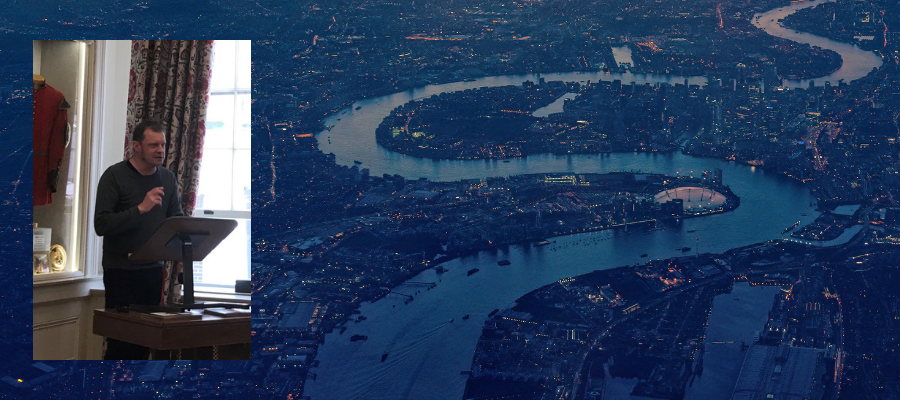🕒 Article read time: 2 minutes
Join the river renaissance, Port of London Director urges Logistics UK delegates

Waterman’s Hall, a Georgian building by the River Thames in the City of London, was the historic setting for Logistics UK’s Water Freight Seminar on 20 May 2022.
Filled with artefacts from its 500-year history, the hall is the property of The Company of Watermen & Lightermen of the River Thames.
Following a welcome from Robert Constant, Hon. Court Assistant and Derek Mann, Master of the Company, James Trimmer, Director of Planning and Development, Port of London Authority (PLA), delivered the keynote address.
LINKING INTERNATIONAL MARKETS TO A MAJOR POPULATION CENTRE
Underlining the importance of the River Thames for freight, Trimmer said: “The Thames is the link between what is now the UK’s principal international gateway and the most populous and economically diverse region in the country. It’s the link that binds the two of them.”
There were three key reasons for fully utilising the river for freight, he argued: sustainability, reliability, and certainty.
A MORE SUSTAINABLE SOLUTION
On sustainability, Trimmer said that it was well established that using the river to move goods results in fewer than half the carbon emissions per tonne per kilometre than using the road. With the inland fleet now transitioning to the use of biodiesel, this was already having a beneficial impact on air quality and emissions, including NOx and particulate matter, in the capital.
“Although there are issues to overcome and investments to be made, the fleet does need to modernise on the river and investment is coming,” he said.
Hybrid vessels will be seen on the river later this year and the PLA is working with operators to help them mitigate the risks of investing in this emerging technology.
PREDICTABLE TIDES PROTECT JOURNEY TIMES
On reliability, Trimmer argued that this was where the river was truly unbeatable. “The tides are predictable and so is the journey time from origin to destination,” he said.
The Thames has formed the principal mode of transport for major infrastructure projects in the capital, including the Lee Tunnel, Crossrail and the Thames Tideway Tunnel. The river was chosen for these projects, Trimmer maintained, owing to its reliability and the certainty of its tides.
The Tideway project, one of the largest infrastructure schemes currently being built in the UK, is the tunnel connecting Acton and Abbey Mills to intercept the 50 million tonnes of raw sewage that flows into the river when it rains. More than five and a half million tonnes of project cargo, from aggregates to tunnel boring machines, has been moved along the river.
DIVERSIFYING FROM BULK CARGO TO LIGHT FREIGHT
It is principally bulk cargoes – aggregates, construction, demolition explosion waste, and household and commercial waste – that are moved along the river. These add up to around four million tonnes of freight a year.
However, Trimmer argued that rather than size of cargo, the key economic principal of moving freight along the river was one of volume.
“To achieve this volume that we need to have on the river to make the economic case work, you need the right infrastructure. And this infrastructure needs to be close to the markets that it serves,” he said.
The river has a network of wharves, which are protected by government, including piers ideally suited for light freight movements. Stretching from Barking Reach in the east to Putney in the west, these piers link directly to commercial and residential communities, so are ready to serve large markets.
The PLA, together with the Thames Estuary Growth Board and the Cross River Partnership, commissioned work on how this pier infrastructure can be future proofed to enable greater freight uses, in addition to passenger use.
A PLAN FOR GROWTH
The PLA is developing an efficient plan to give it the opportunity to construct infrastructure that will maximise what can be moved along the river. This is a plan for growth in freight activity along the river.
“For me, the river is part of the future of urban logistics in London because it offers what the customers need: sustainability, reliability and certainty,” Trimmer said, “Organisations like the PLA are eager to listen and learn what the market wants and to try and facilitate it. I hope that you join us and others in what will undoubtedly be a river renaissance.”
*www.logistics.org.uk/water
Published On: 26/05/2022 16:00:37

Comments Section
If you are a Logistics UK member login to add comments.